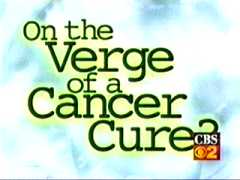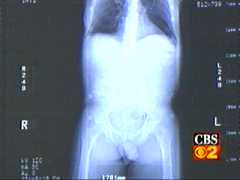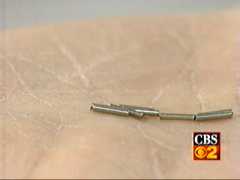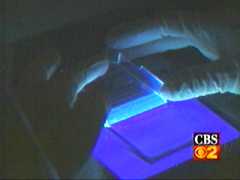 |
 |
 |
 |
| |
||||
On The Verge Of A Cancer Cure? Part IIProstate Cancer  It's one of the top cancer killers in men and it's a topic men won't even discuss. It's one of the top cancer killers in men and it's a topic men won't even discuss. The National Cancer Institute estimates that nearly 40,000 American men will die of prostate cancer a year. But thanks to breakthroughs in cancer research and treatment, prostate cancer could soon be an easier conversation to talk about. CBS 2 News' Michael Tuck will show you the latest procedures being used to change the odds for prostate cancer patients that could save lives. Special Assignment: On The Verge Of A Cancer Cure? Part II aired Monday, April 20, 1998 at 11 p.m. Part I aired Sunday, April 19, 1998 The National Cancer Institute estimates that nearly 40,000 American men will die of prostate cancer a year. It's one of the top cancer killers in men. But there could be an answer to curing this killer, reported CBS 2 News' Michael Tuck. One of the most promising new treatments is called brachy therapy. "Utilizing the newest 3-D interactive ultrasound technology, we can actually place these small packets of radiation directly into the prostate cancer where we want the radiation to work," Dr. Mark Kawachi of the City of Hope Cancer Center told CBS 2 News. "Once in the prostate gland, these pellets we liken very much to smart bombs in that they are packets of energy that are very localized," said Dr. Kawachi. Arthur Spaulding is almost have way through his brachy therapy. He was diagnosed with prostate cancer last year. Until he met Dr. Kawachi, his treatment choices were surgery or older forms of radiation and chemotherapy. "There was no pain connected with this (procedure) at all, I am quite optimistic," Spaulding told CBS 2 News. "There is no reason for me to believe that (the cancer is) not under control. That's the best way of putting it." Beyond brachy therapy, Dr. Kawachi says the future of prostate cancer treatment could lie in genetic science. "Actually gene therapy holds a great deal of promise and perhaps on prostate cancer it's one of the treatments that's really going to pan out for the patient," Dr. Kawachi said. "Gene therapy is a new approach, it's still an experimental approach," Dr. Belledegrun told Tuck. "One gene that can be introduced will correct a defective gene in the cell. Another will stimulate the host immune system to fight the cancer." Dr. Belledegrun's technique is so new it is only in the trial phase and he says it may not be available to the public for several years. But many doctors believe that gene therapy may open the doors to a cancer cure. "I hope that one day gene therapy will actually put me out of business," said Dr. Kawachi. While that day may not come for a while, doctors are working on other prostate treatments like proton beam radiation, another precise way to treat the cancer, said Tuck. For patients like Spaulding the work of these doctors and others offers tremendous hope.
Contact information:
On the Web:
|
||||||||||

|
||||||||||
 |
||
|
12 p.m.
Woman 2 Woman Holiday Decorating Tips 5 p.m. 6 p.m. 11 p.m.
|
||
 |
||
|
4-5 p.m.
Judge Judy Judy Justice! 8 p.m. 9 p.m. 10 p.m.
|
||
| |
||
 Cancer of the prostate. It's a topic some men won't even discuss. But it is a reality every man must face.
Cancer of the prostate. It's a topic some men won't even discuss. But it is a reality every man must face.  The so-called smart bombs work on a time release by sending radiation into the cancer over the course of 3 to 6 months time.
The so-called smart bombs work on a time release by sending radiation into the cancer over the course of 3 to 6 months time.  Dr. Arie Belledegrun at UCLA's Jonsson Cancer Center is a leader in genetic cancer research, said Tuck. His team has identified genetic mutations that cause prostate cancer. By manipulating a similar gene and introducing the new gene directly into the cancer, Dr. Belledegrun says the new gene can replace a cancerous one.
Dr. Arie Belledegrun at UCLA's Jonsson Cancer Center is a leader in genetic cancer research, said Tuck. His team has identified genetic mutations that cause prostate cancer. By manipulating a similar gene and introducing the new gene directly into the cancer, Dr. Belledegrun says the new gene can replace a cancerous one. 

